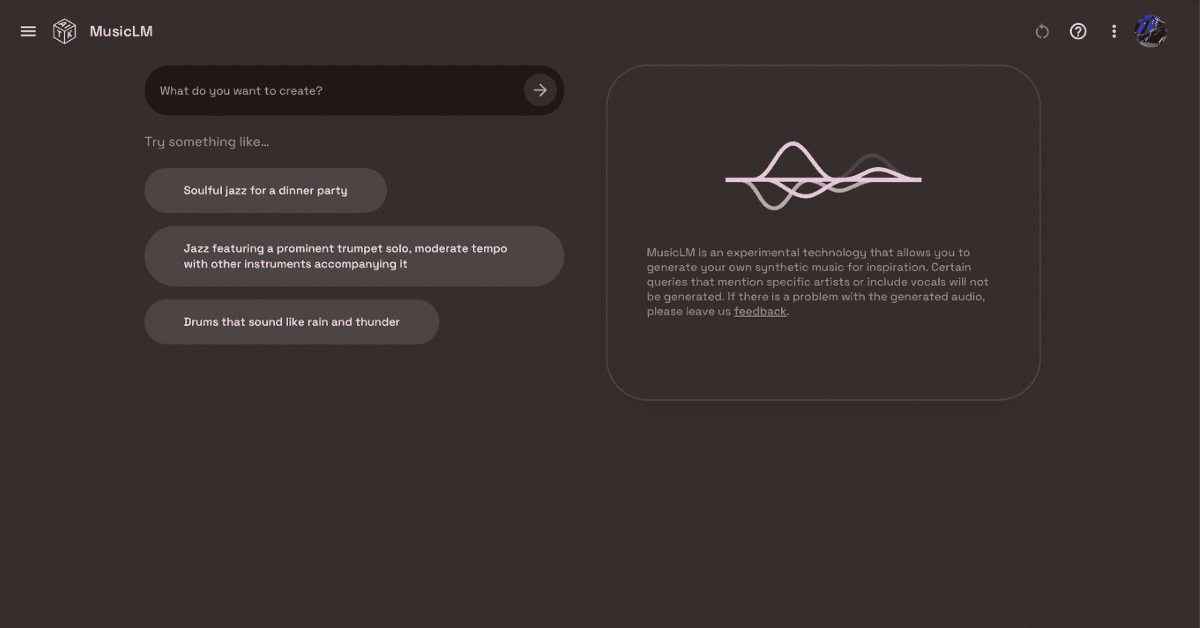
The Groundbreaking Technology Behind Google's MusicLM
Do you remember the days when transforming text into music seemed like a pipe dream?
Google has changed the game with MusicLM, its new text-to-music AI. This powerful technology is capable of converting written text into immersive musical experiences.
But how does it work? And why does it matter to you?
Let's dive into the fascinating world of Google's MusicLM.
Transforming Words into Melodies: The Core Principles
Google's MusicLM employs cutting-edge deep learning algorithms to decipher the complex relationship between text and music.
By analyzing an immense dataset of music, the AI can identify patterns, themes, and emotions to create the perfect music based on your text input.
Even more astonishing is how it generates harmonies, rhythm, and instrumentation together, resulting in a fully-formed composition.
A Symphony of Applications: The Power of Google's MusicLM
The potential uses for Google's MusicLM are virtually endless, transforming industries and opening new doors for creativity.
Let's explore a few examples of how this innovative AI is making waves.
Amplifying Storytelling with Music
Imagine reading a gripping novel or listening to an audiobook with a custom-made soundtrack playing in the background that perfectly reflects the story's emotional journey. That's the power of text-to-music AI. Authors can use this technology to enhance their storytelling, creating a captivating, multi-sensory experience for their readers.
Slow, tension-building symphonic orchestra
An Aid to Music Production
Struggling musicians and composers often need help with creative blocks when trying to write new music. Google's MusicLM can be their muse, providing a starting point for new compositions by generating hooks and harmonies based on specific themes or emotions.
Upbeat EDM
Advertising Reinvented
In advertising, music is crucial in evoking emotions and establishing a brand identity. Google's MusicLM allows marketers to generate tailor-made music that perfectly embodies their brand's values and messaging, creating a memorable connection with their audience.
Vibrant and energetic rock piece for a sports drink commercial
A World of Customized Music: Exploring the Social Impact
Google's MusicLM isn't just a revolutionary tool for creators and industries; it will transform how we engage with music on a personal level.
So let's take a closer look at how this technology is reshaping our everyday lives.
Personalized Playlists
With the ability to generate unique songs based on text inputs, Google's MusicLM is opening the door to truly personalized playlists.
Picture this: typing out a description of your day and having the AI compose the perfect soundtrack to match your experiences and emotions.
Smooth jazz for the ride home.
Emotional Support through Music
Music has long been recognized as a powerful force for emotional well-being.
Google's MusicLM can be a therapeutic tool, enabling individuals to express their emotions through text and receive a customized musical composition in return.
This innovative approach can aid in stress relief and emotional processing.
A Harmonious Future: The Ethics and Challenges of Text-to-Music AI

The potential of Google's MusicLM is vast, but it's not without its ethical considerations and potential obstacles.
So let's delve into some critical issues surrounding this groundbreaking technology.
Intellectual Property and Originality
As AI-generated music becomes more prevalent, copyright and intellectual property questions will inevitably arise. For example:
- Can an AI-generated composition be considered truly original?
- How can creators protect their work in a world where AI can generate similar compositions in mere seconds?
Navigating these complex issues will be essential to ensure a fair and balanced environment for creators and AI-generated content alike.
The Human Touch: The Role of Musicians in an AI-driven World
As AI-generated music becomes more sophisticated, concerns about the potential displacement of human musicians and composers arise.
Will there still be a place for human creativity in music?
It's important to remember that, while impressive, AI-generated music can only partially replicate the human experience and the unique artistic vision that comes with it.
Rather than replacing human musicians, Google's MusicLM can be seen as a tool to assist and inspire them in their creative pursuits.
Ethical Considerations in AI-generated Music
With great power comes great responsibility. As AI-generated music becomes more prevalent, it's essential to consider the ethical implications of its use.
For example, ensuring that AI-generated music does not perpetuate harmful stereotypes or biases is crucial to maintain a fair and inclusive environment.
In Conclusion: Embracing the Harmony of AI and Human Creativity
Google's MusicLM is a groundbreaking technology redefining how we interact with music.
Its potential applications are vast, from storytelling enhancement to personalized playlists and emotional support.
First, however, it's essential to navigate the ethical and legal challenges that come with AI-generated music to ensure a harmonious future where both human creativity and AI coexist.
FAQ
1. Can Google's MusicLM generate music in different genres?
Yes! The AI can generate music across various genres by analyzing patterns and themes in its extensive database of songs and compositions.
2. Is there a limit to the length of text input for Google's MusicLM?
While there's no strict limit, excessively long text inputs may result in overly complex or lengthy compositions. Providing concise and focused input is recommended for the best results.
3. Can Google's MusicLM create lyrics for songs?
The primary function of the AI is to generate melodies, harmonies, and instrumentation based on text inputs. While it may be possible to utilize MusicLM for lyrics generation in the future, its current strength lies in creating music to accompany existing text or themes.
4. How can I access Google's MusicLM?
Google has made its text-to-music AI available to the public, allowing developers and creators to test the technology. Currently, there is a waitlist to use MusicLM.
5. Will Google's MusicLM replace human composers and musicians?
While AI-generated music is impressive, it cannot fully replicate the unique artistic vision and human experience that musicians and composers bring to their work. So rather than replacing them, MusicLM can serve as a tool to assist and inspire their creative pursuits.

